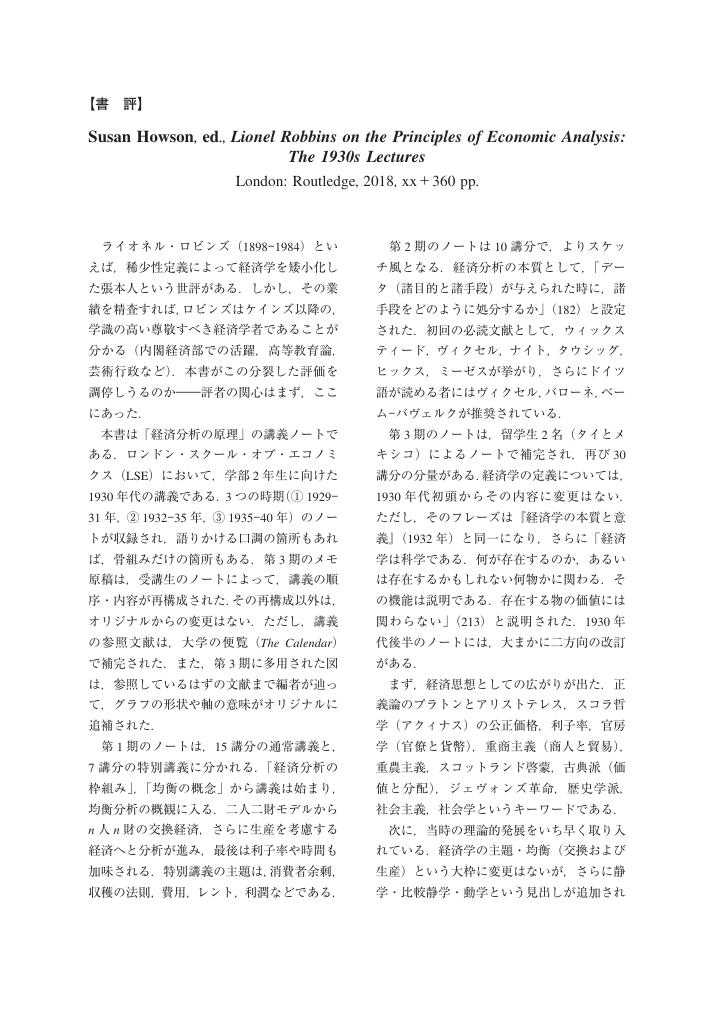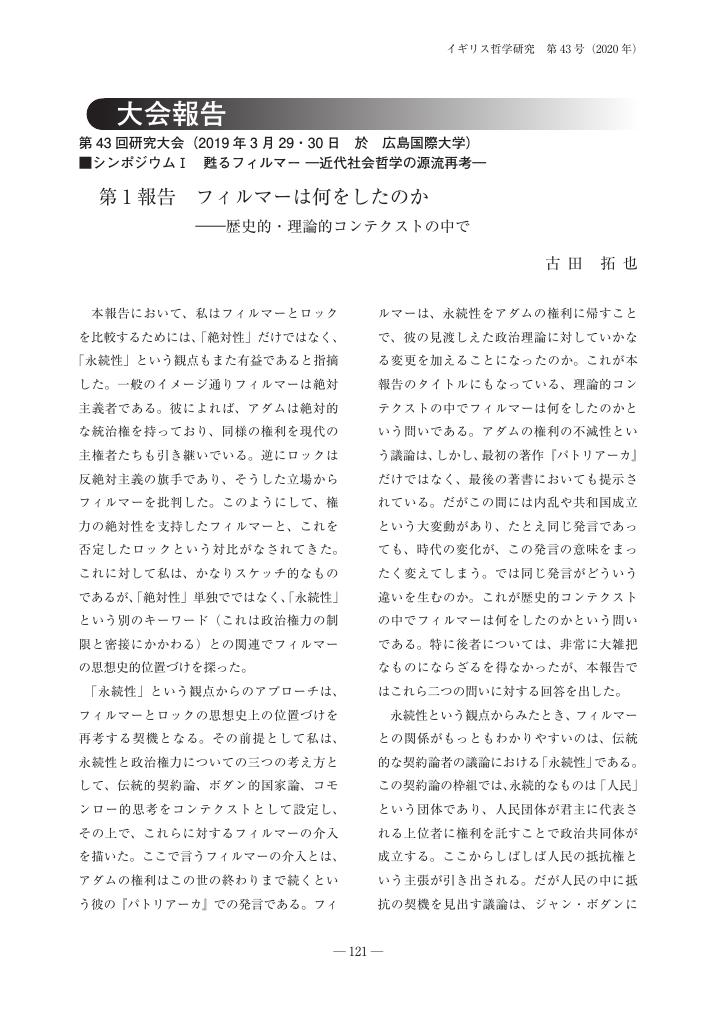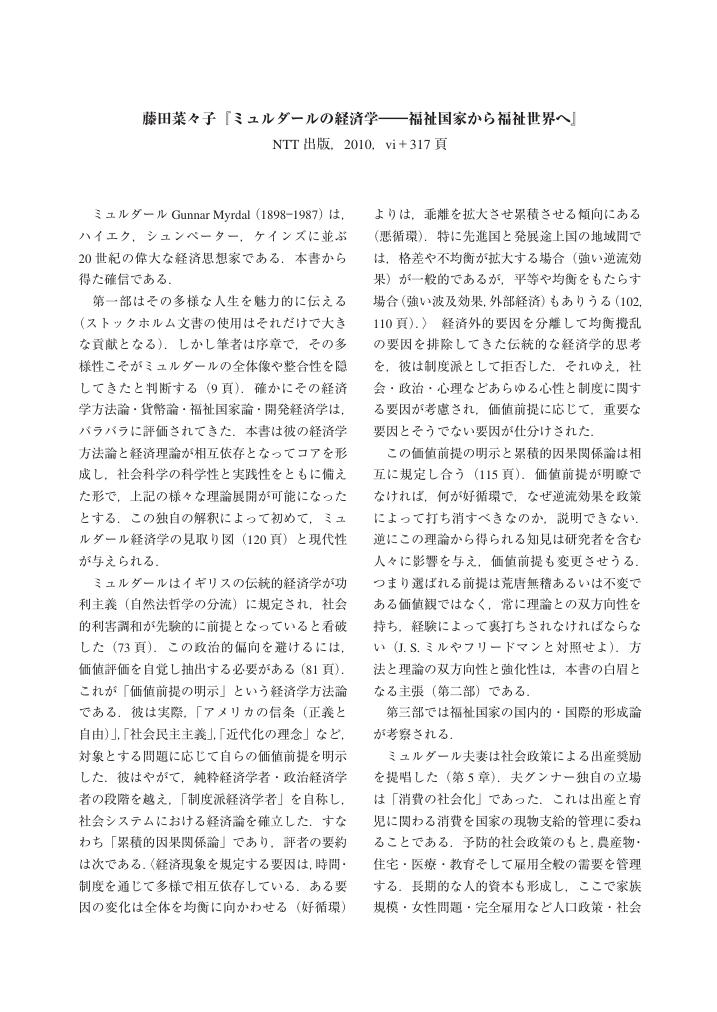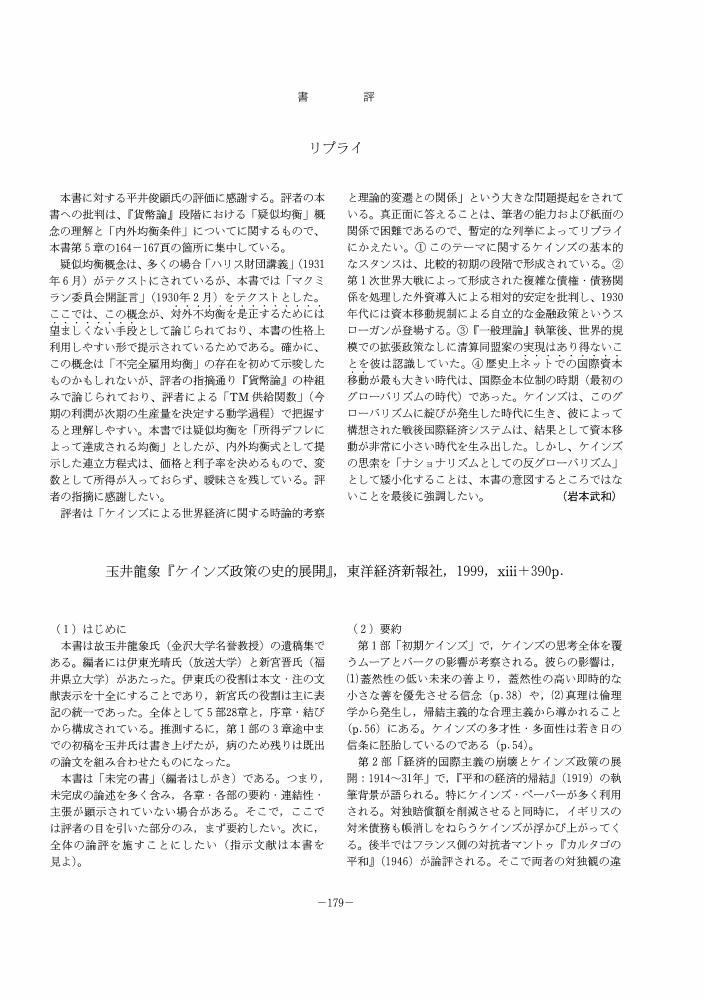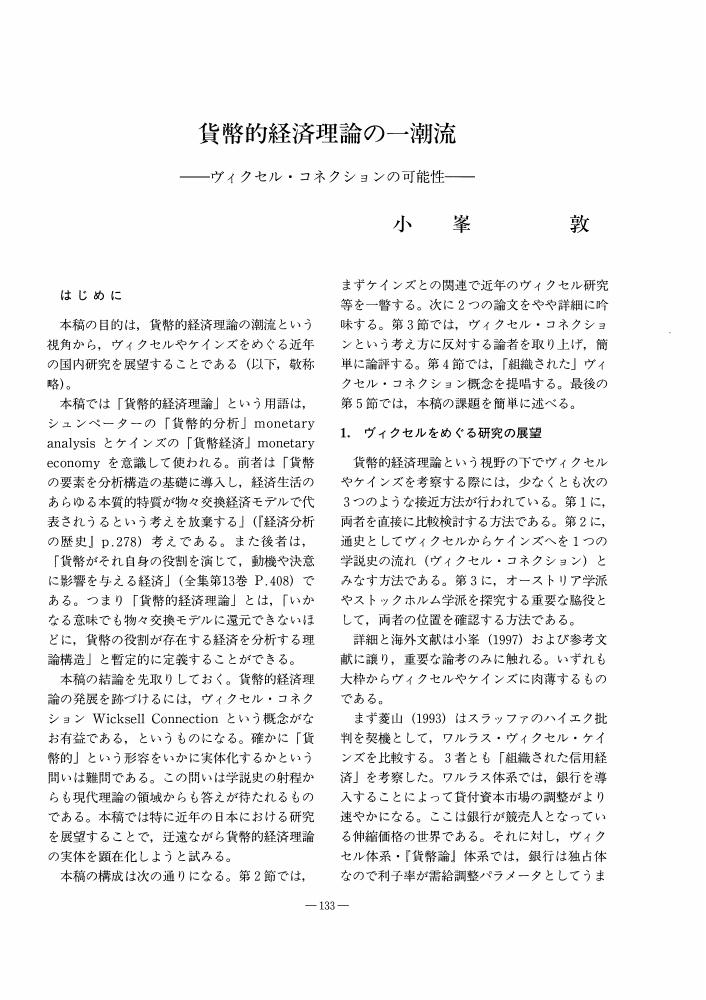64 0 0 0 OA 2010 年代以降の「新しい資本主義論」 経済思想史からの展望
- 著者
- 小峯 敦
- 出版者
- 経済学史学会
- 雑誌
- 経済学史研究 (ISSN:18803164)
- 巻号頁・発行日
- vol.64, no.2, pp.70-103, 2023-01-25 (Released:2023-08-05)
4 0 0 0 戦争と平和の経済思想~経済学の浸透は国際紛争を軽減できるか
本研究は、3つの時代と2つの国(および全世界)という特徴的な時期・国に焦点を当て、「戦争・平和と経済学」の複雑な関係を歴史的・思想的に精査することで、「経済学は戦争を回避し平和を構築することに貢献できるのか」という根源的な問いに回答する。初年度に続き、二年目はこの共同研究を軌道に乗せ、特に、(a))学術雑誌(英語)の「戦争と平和の経済思想」シリーズを特集させること、(b)近隣の社会科学者や政策担当者に開かれた形で、日本語による専門書・啓蒙書を編纂すること、という二点を推進した。その具体例として、(a)学術雑誌History of Economic Thoughtにおいて、War and Economicsというシリーズを2017年度中に3回連載し、研究分担者・連携研究者による3本の英語論文を掲載した。また、(b)いくつかの出版社と交渉し、『戦争と平和の経済思想』(晃洋書房、2018年度後期に出版予定)として出版するべく、11人による原稿を集め、草稿を検討する研究会も行った。2017年度における最大の実績は、Fabio Masini (the University of Roma Tre, Italy) とMaria Paganelli (Trinity University, USA)という研究者を招き、2日間に渡り、広島修道大学で国際会議を開催したことである(2017.9.4-5)。平和記念館の資料にもアクセスできたことは大きな収穫であった。二番目の実績は、経済学史学会・全国大会で、スミス研究の世界的権威Nicholoas Phillipsonの招待講演を実現したことである。特に、現実主義的な側面をスコットランド啓蒙研究の立場から、一般会員にも平易に講演された。
- 著者
- 小峯 敦
- 出版者
- 龍谷大学社会科学研究所
- 雑誌
- 社会科学研究年報 = Annual bulletin of Research Institute for Social Sciences (ISSN:0288481X)
- 巻号頁・発行日
- no.49, pp.1-14, 2018
- 著者
- 小峯 敦
- 出版者
- 経済学史学会
- 雑誌
- 経済学史研究 (ISSN:18803164)
- 巻号頁・発行日
- vol.63, no.1, pp.64-65, 2021 (Released:2022-01-09)
- 著者
- 小峯 敦
- 出版者
- 経済学史学会
- 雑誌
- 経済学史研究 (ISSN:18803164)
- 巻号頁・発行日
- vol.61, no.2, pp.78-79, 2020 (Released:2020-02-29)
2 0 0 0 OA ノーマン総裁とケインズ
- 著者
- 小峯 敦
- 出版者
- The Japanese Society for the History of Economic Thought
- 雑誌
- 経済学史学会年報 (ISSN:04534786)
- 巻号頁・発行日
- vol.36, no.36, pp.64-76, 1998 (Released:2010-08-05)
- 参考文献数
- 41
The purpose of this paper is to reconsider the contribution of Montagu Collet Norman (1871-1950) in comparison with that of John Maynard Keynes (1883-1946). Norman, Governor of the Bank of England (1920-1994), was one of the key figures responsible for the monetary and industrial policies in interwar Britain.There exist two sharply contrasting interpretations of Norman's work. The first interpretation is represented by Pollard [1922], who criticized Norman for implementing “the Designed Deflationary Policy.” The second can be found in Clay [1957] and Sayers [1976], who appreciated Norman's promotion of “Rationalization in Industry.” Of those in the second camp, Tanaka [1976] in particular characterized Norman's actual intention as “the Dis-deflationary Policy, ” i. e., as a policy intended to avoid further deflationary effects derived from the previous high bank rate.In this paper, I concluded, when reading and reconstructing Norman's and Keynes's letters, memoranda, and other evidence for the Macmillan Committee (1930), that neither of these two understandings of Norman is appropriate. In the present work I introduce a new label for Norman's work: “the Dogma of Independence between Depression and Monetary Policy.”Finally, upon rethinking the motives and results of the monetary and industrial policies of the 1920s in comparison with Keynes's ideas, I conclude that an understanding of Norman's “innovative contribution” as fairly restricted would be the most appropriate.
2 0 0 0 OA 経済思想史における人口・貧困・福祉:国際比較研究
経済学の歴史において、人口は国民の貧困や福祉に重大な影響を与える要因として、常に注目されていた。本研究ではこの視点を各国比較の参照枠として捉え、フランス、イタリア、インドなどを具体的に取りあげた。その結果、現在の経済学では所与と捉えがちな人口という条件が、人々の生活(つまり貧困や福祉)にいかに影響を与え続けてきたか、という歴史的な教訓を再確認することができた。科研費メンバーはそれぞれ、リヨン(フランス)、サレント(イタリア)など各地に赴き、現地の研究者と交流することで、今後、この論題を発展する手がかりをつかむこともできた。
1 0 0 0 OA 大会報告
1 0 0 0 OA ケインズーベヴァリッジ体制の起源と現代性:半自治組織による効率と公平
本研究の最大の成果は、ケンブリッジ大学中央図書館およびLSE文書館などにおいて、ケインズおよびベヴァリッジの原典(手紙・メモ・草稿を含む一次資料)を精査することを通じ、次の認識に至ったことである。すなわち、戦間期の巨大な知としての両人は、効率と公平を両立させる構想を推進しており、特にケインズにおけるその内実は、次のような複合的な組織を実現することであった。つまり、公共心を持った大規模経営者、真性な長期期待に基づく投資家、公平無私な政策担当者、専門的知を持った経済助言官、適切な経済情報を流す公共メディアという複合体である。この複合体こそ、彼らの言葉に即した「投資の社会化」の実態である。
1 0 0 0 OA Recent Research on Keynes:
- 著者
- 小峯 敦
- 出版者
- The Japanease Society for the History of Economic Thought
- 雑誌
- 経済学史研究 (ISSN:18803164)
- 巻号頁・発行日
- vol.58, no.1, pp.120-138, 2016 (Released:2019-08-31)
A brief yet hopefully exhaustive sketch of recent studies on Keynes brings us four concluding remarks. First, thanks to professionalisation of the history of economic thought, the 14 academic journals (their abbreviations are shown be-low), at least, are ready to accept articles on historical and theoretical perspec-tives of Keynesʼs ideas. This directly leads to an increase in academic papers (in English) in quantity, and consequently, to better understandings of Keynes in quality. However, confining to narrow academic circles could also bring a fall of influential powers in the history of economic thought, despite of its role to bridge both among other disciplines one another and academia with ordinary people. Second, one of the most conspicuous characteristics of the research trends is to emphasise Keynesʼs multiple phases of international relations in practice and in theory. These cover not only the international monetary system but also corporative designs to balance both among national and international interests and among just, fair world and economic efficiency towards a peaceful world. Third, Keynesʼs ideas provoke current economists to study on recent fashionable themes such as on happiness, behavioural economics, neuroscience, and psycho-logical economics. Among them, the relation between agents on a micro level and economic phenomena on a macro level is the most difficult theme to solve. Nevertheless, Keynesʼs insight into the organic whole in macroeconomics can serve as a clue. Fourth, strict interpretations of original texts are necessary, sometimes by way of unpublished primary sources, to extract the relevant usage of economics. The history of economic thought serves this end. In the near fu-ture, historians of economics can even apply a new method, such as text-mining and handling big data, to this academic area. Judging from both the numerous articles mentioned above, and the Keynes Societies of Germany and Japan that were established in 2003 and in 2011 re-spectively, studies on Keynes seem to be more active than before. It is, neverthe-less, questionable whether the mere efforts by historians of economics could reach economic theorists along with general readers. I would like to end this review article by citing OʼDonnell (2011), which raises three fundamental questions: (i)Why is Keynes so different from ortho-dox economists?; (ii)Why is Keynes more difficult to understand than ortho-dox economists?; and (iii)Why is Keynes more appealing than orthodox econ-omists? Although OʼDonnell (2011, 10-11) answers these questions, it is now important to tackle the three knots, regardless of historians of economics, theo-retical economists, or even general readers. If I were asked to choose just two words to characterize Keynesʼs thought as a whole, they would be reason and humanity. (OʼDonnell 2011, 11)
- 著者
- 小峯 敦
- 出版者
- 経済学史学会
- 雑誌
- 経済学史研究 (ISSN:18803164)
- 巻号頁・発行日
- vol.52, no.2, pp.155-156, 2011 (Released:2019-10-28)
- 参考文献数
- 2
1 0 0 0 OA F. ラヴィントンにおける企業家の役割 理論構築,現状認識,および規範的な行動基準
- 著者
- 小峯 敦
- 出版者
- 経済学史学会
- 雑誌
- 経済学史研究 (ISSN:18803164)
- 巻号頁・発行日
- vol.51, no.1, pp.60-75, 2009 (Released:2019-06-21)
- 参考文献数
- 50
Frederic Lavington (1881–1927) played a significant role as a node between Marshall’s and Keynes’s eras. While Marshall trusted on the individual chivalrous entrepreneur, Keynes no longer depended on such an individual and placed his hopes on semi-autonomous bodies guided by public authorities. Although Lavington was a devotedly orthodox Marshallian, he was also a revolutionary theory developer, and he was located in the transition period between the two important figures. He recognised an inherent instability in the modern economies of the time but still held an optimistic view of capitalism. Lavington relied on able entrepreneurs as a group, who he believed could eliminate the contradictions between individual rational calculations and collective disturbing consequences. Lavington’s insight on capitalism can be understood as a threefold-layer structure, at the core of which is an entrepreneur. This structure comprises the following: (1) theory construction, related to revolutionary devices such as liquidity preference and portfolio selection, (2) contemporary recognition, related to the trade cycle and (3) normative behavour, related to leaders in industry. The first is concerned with rational behaviour under uncertainty; the second, with unexpected disturbances and the third, with a coordination problem: if the captains of industry work well in business organizations, the gap between the micro- and macro-layers tends to reduce. Although he was very close to Keynes in the light of points (1) and (2), Lavington shared almost the same view of Marshall in the light of point (3). This duality had made evaluations on him extremely difficult. JEL Classification: B10, B31, L16
- 著者
- 小峯 敦 服部 茂幸 木村 雄一 山崎 聡
- 出版者
- The Japanease Society for the History of Economic Thought
- 雑誌
- 経済学史研究 (ISSN:18803164)
- 巻号頁・発行日
- vol.48, no.2, pp.102-107, 2006-12-20 (Released:2010-08-05)
- 参考文献数
- 13
1 0 0 0 OA スキデルスキーのケインズ
- 著者
- 小峯 敦
- 出版者
- 経済学史学会
- 雑誌
- 経済学史学会年報 (ISSN:04534786)
- 巻号頁・発行日
- vol.45, no.45, pp.91-94, 2004 (Released:2010-08-05)
1 0 0 0 OA 玉井龍象『ケインズ政策の史的展開』, 東洋経済新報社, 1999, xiii+390p.
- 著者
- 小峯 敦
- 出版者
- 経済学史学会
- 雑誌
- 経済学史学会年報 (ISSN:04534786)
- 巻号頁・発行日
- vol.38, no.38, pp.179-180, 2000 (Released:2010-08-05)
1 0 0 0 OA 貨幣的経済理論の一潮流
- 著者
- 小峯 敦
- 出版者
- The Japanese Society for the History of Economic Thought
- 雑誌
- 経済学史学会年報 (ISSN:04534786)
- 巻号頁・発行日
- vol.35, no.35, pp.133-140, 1997 (Released:2010-08-05)
- 参考文献数
- 48
1 0 0 0 OA ホートレーからケインズへ
- 著者
- 小峯 敦
- 出版者
- The Japanese Society for the History of Economic Thought
- 雑誌
- 経済学史学会年報 (ISSN:04534786)
- 巻号頁・発行日
- vol.32, no.32, pp.74-85, 1994 (Released:2010-08-05)
- 参考文献数
- 41
Although R. G. Hawtrey (1879-1975) had been an outstanding monetary economist in the 1920s and 1930s, and was greatly respected by Keynes, the subsequent ‘Keynesian Revolution’ made Hawtrey's analysis out-of-date. But recently the situation has been changing. Now it is time for a reappraisal.In a Treasury memorandum entitled “Germany and the Reparations Burden” (Sep. 1928) and in working paper No. 66 of the Macmillan Committee (Jan. 1931), Hawtrey independently devised the ‘multiplier theory’ (that is, if investment increases, output will also increase until additional saving is balanced to additional investment). This preceded the work of R. F. Kahn. Interestingly Keynes (and later Kahn), who read these papers, appreciated Hawtrey's analysis. Nevertheless we cannot insist that Hawtrey's thought including the multiplier theory) influenced Keynes's thought. Why?The clue to solving this paradox lies in the nature of Hawtrey's ‘dealers economics’. He always put stress upon the role of dealers (market intermediaries who hold stocks) and trade fluctuations triggered by money-flow change. On the other hand, Keynes emphasized the role of entrepreneurs and money-stock change (ex. liquidity preference). The difference is deeper than it seems. That is the reason why Hawtrey cannot occupy a crucial place in the making of Keynes's ‘General Theory’.
1 0 0 0 OA ケンブリッジ、オクスフォード、LSEの経済思想と現代福祉国家の変容
19世紀末以降のケンブリッジ、オクスフォード、LSEの経済思想の展開を、現代福祉国家の変容・危機を視野に入れて、共同研究を進め成果を得た。具体的には、1. 「創設期の厚生経済学と福祉国家」から厚生経済学史の再検討へ、2. リベラリズムの変容と福祉国家-ニュー・リベラリズムからネオ・リベラリズムへ、3. マーシャル、ケインズと同時代の経済思想、4. ケインズと現在の世界経済危機-戦間期との比較考証、の4点を中心に国際共同研究を進め成果を得た。
1 0 0 0 OA ケインズの管理経済論 : 失業対策と大蔵省見解
- 著者
- 小峯 敦
- 出版者
- 新潟産業大学
- 雑誌
- 新潟産業大学経済学部紀要 (ISSN:13411551)
- 巻号頁・発行日
- vol.20, pp.105-128, 1999
本稿の目的は,「政策におけるケインズ革命の意義」に1つの解釈・解答を与えることにある。そのために,まずケインズの理論・政策・実際へのインパクトの三者の関係が整理される。考慮される期間は1910年代中盤から1932年頃である。結論として,政策におけるケインズ革命は確かに存在したと主張する。ただしここでの「革命」は,特に大蔵省などの政策担当者が,ケインズの理論と思考を意識(対抗)せざるを得なかった,という意味である。イギリスでは1920年代初頭から20年の年月を経て管理経済が徐々に浸透した。ケインズは管理経済の理論的基盤を整備し,しかも政策提言という形でその理論の説得を行い,政策の実現に腐心した。理論と実践の相乗効果で,経済の管理化は1920年代以降,無視し得なくなった。ケインズの影響力は(政策提言が実現しなかったとしても)極めて大きかった。この意味で,政策と思考におけるケインズ革命は20年余の歳月をかけて完成したと言うことができる。第1部は『インドの通貨と金融』から金本位制の復帰問題までを扱う。ケインズは危機意識(イギリスの衰退)と使命感(経済の制御で厚生増大)を終生持続した。第2部は失業対策からケインズ革命までを扱う。ケインズの管理経済という新しい学説に批判されて,大蔵省の「財政正統説」やイングランド銀行の「金融正統説」が妥当性を失っていった。

